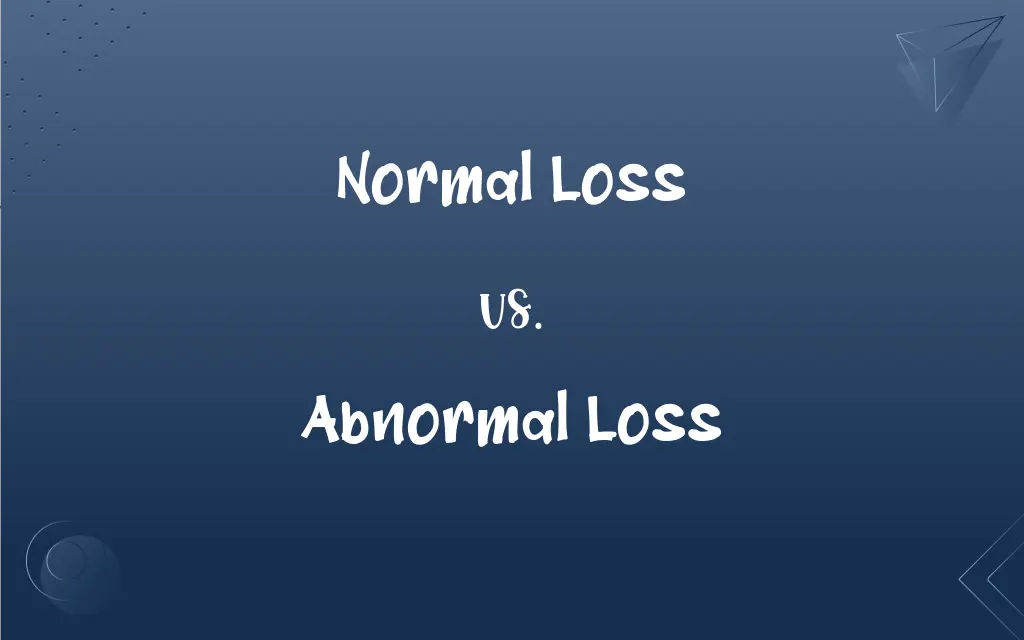Normal Loss vs. Abnormal Loss: What's the Difference?
Edited by Janet White || By Harlon Moss || Published on November 11, 2023
Normal loss is the expected or unavoidable reduction in materials during production, while abnormal loss exceeds the expected range and is often preventable.

Key Differences
Normal loss refers to the inherent and expected decrease in material quantity during the manufacturing or production process. This loss is anticipated and accounted for in cost calculations.
Abnormal loss, however, represents the loss that exceeds the standard or expected level. It's often due to unforeseen circumstances or inefficiencies in the production process.
The cost of normal loss is usually absorbed into the cost of production, effectively spreading it across the output. This is an accepted business practice, as some loss is unavoidable.
Abnormal loss, conversely, is often recorded separately as it indicates an inefficiency or problem that needs addressing. It's not built into the product's cost but rather treated as a separate expense or loss.
Both normal loss and abnormal loss are important concepts in cost accounting and production management. Understanding and differentiating them helps businesses in better inventory management and cost control.
ADVERTISEMENT
Comparison Chart
Definition
Expected material reduction during production
Excessive loss beyond expected limits
Cost Treatment
Included in the cost of production
Recorded separately as a loss
Predictability
Anticipated and unavoidable
Unforeseen and often preventable
Accounting Approach
Cost absorbed in product price
Treated as a separate expense
Management Implication
Accepted as part of process
Indicates need for process improvement
ADVERTISEMENT
Normal Loss and Abnormal Loss Definitions
Normal Loss
Expected Reduction.
Normal loss during shipment is calculated in advance.
Abnormal Loss
Preventable Shrinkage.
Abnormal loss from poor handling was avoidable.
Normal Loss
Inherent Loss.
Normal loss in the winery includes evaporation.
Abnormal Loss
Excessive Loss.
Abnormal loss due to machine breakdown was costly.
Normal Loss
Unavoidable Shrinkage.
Normal loss of weight in drying fruits is expected.
Abnormal Loss
Unexpected Reduction.
Abnormal loss in inventory raised concerns.
Normal Loss
Production Reality.
Normal loss of material is common in manufacturing.
Abnormal Loss
Separate Expense.
The company recorded the abnormal loss separately.
Normal Loss
Cost Accounting Term.
Normal loss is factored into overall product cost.
Abnormal Loss
Efficiency Indicator.
Abnormal loss indicated a need for process review.
FAQs
How is abnormal loss identified?
When loss exceeds expected or standard limits.
What causes abnormal loss?
Inefficiencies, accidents, or unforeseen events.
How do companies plan for normal loss?
By incorporating it into cost and inventory planning.
What actions follow an abnormal loss?
Investigation, process review, and corrective measures.
Is normal loss always the same percentage?
It varies but remains within a predictable range.
Does abnormal loss affect profit?
Yes, it can lead to unexpected expenses.
What constitutes normal loss?
Losses that are inherent and expected in production.
Is normal loss industry-specific?
Yes, it varies greatly across different industries.
Can normal loss become zero?
Rarely, as some loss is usually inherent.
Can normal loss be reduced?
Not significantly, as it's inherent to the process.
Can abnormal loss be recovered?
Sometimes, through insurance or process improvements.
Does abnormal loss indicate poor management?
It can, but not always; external factors also play a role.
How is normal loss accounted for?
As part of the cost of goods sold or production costs.
How does abnormal loss affect inventory?
It leads to discrepancies and potential shortages.
Does technology reduce normal loss?
It can minimize but not eliminate it.
How do customers perceive normal loss?
Generally, it's not noticeable as it's built into pricing.
Can training reduce abnormal loss?
Yes, especially if due to human error.
Is normal loss considered wastage?
Not typically, as it's an expected part of production.
Are there tax implications for abnormal loss?
It depends on the accounting treatment and jurisdiction.
Is insurance applicable to abnormal loss?
Often, especially if due to accidents or disasters.
About Author
Written by
Harlon MossHarlon is a seasoned quality moderator and accomplished content writer for Difference Wiki. An alumnus of the prestigious University of California, he earned his degree in Computer Science. Leveraging his academic background, Harlon brings a meticulous and informed perspective to his work, ensuring content accuracy and excellence.
Edited by
Janet WhiteJanet White has been an esteemed writer and blogger for Difference Wiki. Holding a Master's degree in Science and Medical Journalism from the prestigious Boston University, she has consistently demonstrated her expertise and passion for her field. When she's not immersed in her work, Janet relishes her time exercising, delving into a good book, and cherishing moments with friends and family.







































































